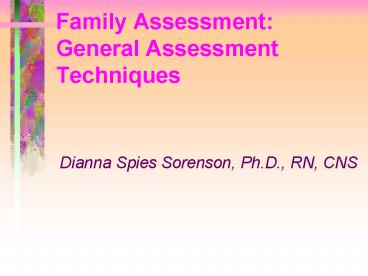Family Assessment: General Assessment Techniques - PowerPoint PPT Presentation
1 / 25
Title:
Family Assessment: General Assessment Techniques
Description:
How do you feel when she does this in public? What do you do first to deal with the behavior? ... the animal or object game or sculpture. Central Organizing ... – PowerPoint PPT presentation
Number of Views:97
Avg rating:3.0/5.0
Title: Family Assessment: General Assessment Techniques
1
Family AssessmentGeneral Assessment Techniques
- Dianna Spies Sorenson, Ph.D., RN, CNS
2
Definition of Functional Families
- A functional family occurs as an open system
where messages are both sent received. These
messages are clear, precise, congruent within
the context of the situation. Furthermore, a
functional family provides nurturing among its
members promotes a high degree of self-worth.
3
Characteristics of Functional Families
- Smooth rhythm of interaction
- High spontaneous agreement
- Overall pattern of solving serious problems
- Parents use lt threats and acts of punishment
- Directions are clear
- Parents listen
- Provide a context of relief
- Interested in have time for children
- Parents dont feel guilty for stopping demanding
behavior
- Parents are good role models
- Parents expect high quality efforts
- Children are able willing to meet parental
expectations - Parents let the kids do their own growing
- Children get along well help each other
- Parents as individuals are friendly relaxed
- Parents share common interests apart form the
children
4
Elements of Family Assessment
- Demographics
- composition
- history
- social class
- education
- vocation/profession
- housing
- clothing
- nutrition
- community
- social network
5
Elements of Family Assessment
- Boundaries
- open/rigid
- internal alliances
- Roles
- complementarity
- evolution
- socialization
- Energy
- internal
- environmental
6
Elements of Family Assessment
- Power
- influence opinion
- punishments/rewards
- physical
- who has power
- Change/Flexibility
- problem solving
- articulate needs
- outside assistance
- evaluate
7
Elements of Family Assessment
- Communication
- accept responsibility for thoughts, feelings,
actions - clarity
- verbal skills
- talk for self
- talks to whom
- message completeness
- generalizations
- express thoughts/feelings
- validation
- feedback
- direct
- indirect
- receptivity to feedback
- complementarity
8
Elements of Family Assessment
- Health Care Function
- beliefs
- knowledge
- life style
- prevention
- history
- utilization of health services
- power, energy, resources
9
Elements of Family Assessment
- Coping Strategies
- stress/stressors
- defense mechanisms
- inner resources
- perceptions
- cohesiveness
- resiliency
- integration
- control
- spirituality
- External resources
- education
- social support
- health care services
- government assistance
10
Elements of Family Assessment
- Strengths
- What are present?
- Awareness
- potential/latent
- How to develop
11
Questioning
- Linear
- General
- Circular
12
Circular Difference Question Explores
differences between people, relationships, time,
ideas, beliefs
- What was the best advice youve received?
- Who was the most skeptical about the advice?
- Who was the first to act on the advice?
- Cognitive
- Affective
- Behavioral
13
Circular Behavioral Effect Question Explores
connections between the effect of one family
members behavior on another
- How do you make sense of Janes outburst?
- How do you feel when she does this in public?
- What do you do first to deal with the behavior?
- Cognitive
- Affective
- Behavioral
14
Circular Hypothetical/Future Question Explores
family options alternatives or meanings in the
future
- Cognitive
- Affective
- Behavioral
- What do you think will happen if dads behavior
doesnt change? - If he continues to hit, who do you think will
feel the most emotional pain? - How much longer will you be able to tolerate
living with him?
15
Circular Triadic Question Question posed to a
3rd person about the relationship between two
other people
- How does mom know when to back off from nagging
dad? - How does dad feel when mom nags?
- What does dad need to do to get mom to stop
nagging?
- Cognitive
- Affective
- Behavioral
16
Tests
- Inventories
- Questionnaires
17
Behavioral Observation
- Verbal
- nonverbal
18
Exercises to Explore Beliefs/patterns of
Interaction
- Typical day
- Family floor plan
- Identify expectations
- Life style
- Photo album
- Success chart
19
Sculpting
- Physical expression of the relationships among
members
20
Metaphorical Methods
- autobiographies
- composing stories
- diaries
- drawing
- dreams
21
Behavioral Task Rx
- Prescribed during session
- Prescribed as home work
22
Genogram/Ecogram
- Chart family constellation
- chart relationships
23
Central Organizing Factors
- Symptom as a metaphor
- the word, phrase or caption
- what the practitioner feels wants to do
- the animal or object game or sculpture
24
Central Organizing Factors
- tracking
- identifying priorities as organizing principles
25
Central Organizing Factors
- Identify reciprocal role relationships
- look to the direction of the behavior then to
the opposite































